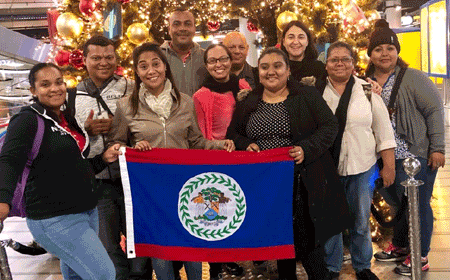The Hague – November 26, 2018– Being host to multiple international courts and over 150 international organizations, The Hague – or in Spanish, La Haya – in the Netherlands is known as the “International City of Peace and Justice.” Its fame in diplomacy dates back to the 17th Century and it remains an international conferences center to this day. In 1946, the International Court of Justice (ICJ) became the first international tribunal to be established in The Hague at the Peace Palace.
Scheduled to visit the Court on Tuesday November 27 is a team of Belizean journalists currently in The Hague at the invitation of the United States Embassy in Belize. Their project is titled “From Fear to Facts: Demystifying the ICJ.” A first day of meetings included visits with experts who have interacted with the Court. They discussed, among others things, court procedure.
The Court adjudicates two types of proceedings: contentious cases (legal disputes submitted by states only) and advisory proceedings (requests for legal opinions that can only be submitted by UN organs and its specialized agencies). Importantly, no state can be sued if it does not consent to ICJ arbitration.
There are two mechanisms by which a case may be taken before the ICJ. One is via an application by a state party and the other is through the notification of a Special Agreement. In the case of the latter, the accompanying notification should indicate “the precise subject of the dispute” if that is not already apparent in the Special Agreement. In such a case, proceedings are opened on the date the agreement is received by the ICJ Registrar. What follows thereafter is a first round of written pleadings which customarily take at least 18 months or more but usually not less. This will include a “memorial” and a “counter memorial” that is not less than 150 pages and not more than 300 pages in length. It’s a detailed statement of the facts and legal arguments of either party. Importantly, these submissions are confidential and will not be publicized until the oral hearings stage but only if both parties do not object to their publication.
Once oral proceedings conclude, the judges will deliberate in camera and then deliver a judgment at a public sitting. The proceedings can take up to 5 years or more. Disputes are decided based on an existing treaty, international law, international customs, general principles of law, and judicial decisions (precedence) and writings of the most highly qualified international law experts.
Playing an instrumental role in the proceedings before the court will be an “Agent” of either government. This is the technical expert appointed by the state to communicate regularly with the ICJ Registrar, the representative of the state before the ICJ. The individual is normally the country’s Minister of Foreign Affairs or its ambassador to the Netherlands but does not have to be. He or she is usually an attorney (with good diplomatic skills and foreign policy knowledge) and will be the person the Court consults on questions of procedure. Aside from the state’s counsels and advocates, that person may also have to answer questions or provide explanations for the Court during the hearing – immediately or by a prescribed time. They also get to question witnesses and experts. In essence, they lead the team of legal experts for a state.
Photo: Belizean reporters from different media houses at the Hague

